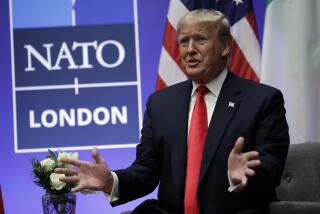Price for Super-NATO Is Too High
- Share via
Watching President Clinton deliver his State of the Union address, I regret to say, made me feel like a passenger on the Titanic. Even though our ship of state has entered very hazardous waters abroad, our captain spent less than one minute of his hour-plus speech explaining his position on NATO expansion. Yet this proposal will create, in the words of National Interest editor Owen Harries, nothing less than a “geostrategic revolution.”
Like the captain of that ill-fated liner, Clinton has been warned that icebergs are everywhere, but he is steaming full speed ahead, ignoring what may lie beneath the surface, insisting that our vessel is indestructible, unsinkable.
The U.S.-Baltic Charter, signed in early January, is one of those icebergs.
There is no allied consensus on a range of related unknowns concerning the Baltic states’ future, such as: What the new mission of the post-Cold War NATO will be; how many countries will eventually join; what Russia’s rightful place in the new Europe is; what the costs of expansion will be and who will pay them.
Despite the allies’ disagreement on these most fundamental NATO issues, expansion advocates say that when it comes to the Baltic question, at least, there will be plenty of time to avert collision.
I am not so sure.
To begin with, the administration’s promise to Latvia, Lithuania and Estonia that the U.S. will support their membership in NATO is recklessly preemptive. It committed us to working on their behalf without a debate. The document making this premature commitment, the U.S.-Baltic Charter, was not made public until the day of the ceremony, when the Senate was in recess.
The charter obligates the United States to support NATO membership for the three former Soviet republics against the wishes of the Russian republic. The Russians have warned for more than a year that they might walk out of the NATO-Russian Founding Act if the Baltics are admitted.
The Russians are not kidding about this. They were “had” before, and are determined not to let it happen again. At the time of the unification of Germany, the dismantling of the Warsaw Pact and the collapse of the Soviet Union, Mikhail Gorbachev accepted the West’s verbal assurances that we would not take advantage of his country’s crumbling position by expanding NATO. He didn’t think to get it in writing. Although Boris Yeltsin was unable to secure legal assurances on a number of NATO issues, Moscow has continuously reiterated its position that the Baltics’ membership would be unacceptable. (Despite Moscow’s concerns, by the way, we signed this charter only a few months after the Baltics flatly rejected Russian security guarantees.)
The Russians have reasons to worry. Baltic membership would bring with it a reconfiguration of forces in NATO. At the same time, the only way the allies could defend the three former Soviet republics, under the NATO treaty’s security guarantee, would be with renewed reliance on nuclear weapons. This would force the Russians to take corresponding measures.
For this and other reasons, our NATO allies have been resolutely against membership for the Baltics. Washington’s unilateral persistence on this might eventually lead to a fatal split in the alliance.
Regrettably, many people in Washington understand “the Baltic problem” all too well and say privately, but not publicly, that the only solution is to close alliance membership after the accession of Poland, Hungary and the Czech Republic. The problem is that endorsing such an approach would be to agree in advance to a discriminatory policy that would only create a new and potentially destabilizing dividing line in Europe.
Given our dangerous course, the only prudent thing to do is to delay or reject NATO expansion. Through NATO, its Partnership for Peace, a military network that includes all countries of the former Communist bloc and the Organization for Security and Cooperation in Europe, we have everything we need right now to provide for security, democratization assistance and crisis prevention.
Given the stakes, I don’t buy the argument that rejecting NATO expansion would damage our credibility. After all, if the Titanic’s captain had stopped the ship and changed course no one would have said later that he had made the wrong decision.
More to Read
Sign up for Essential California
The most important California stories and recommendations in your inbox every morning.
You may occasionally receive promotional content from the Los Angeles Times.












